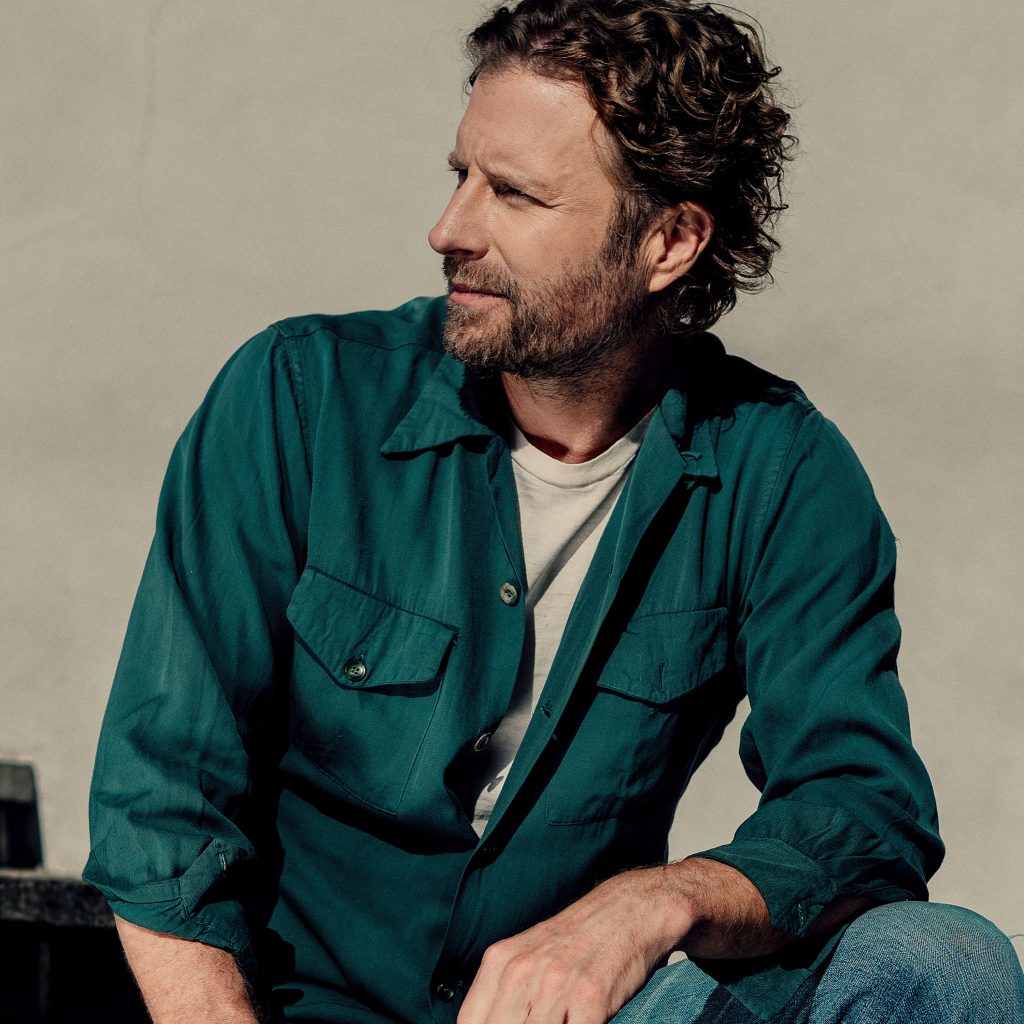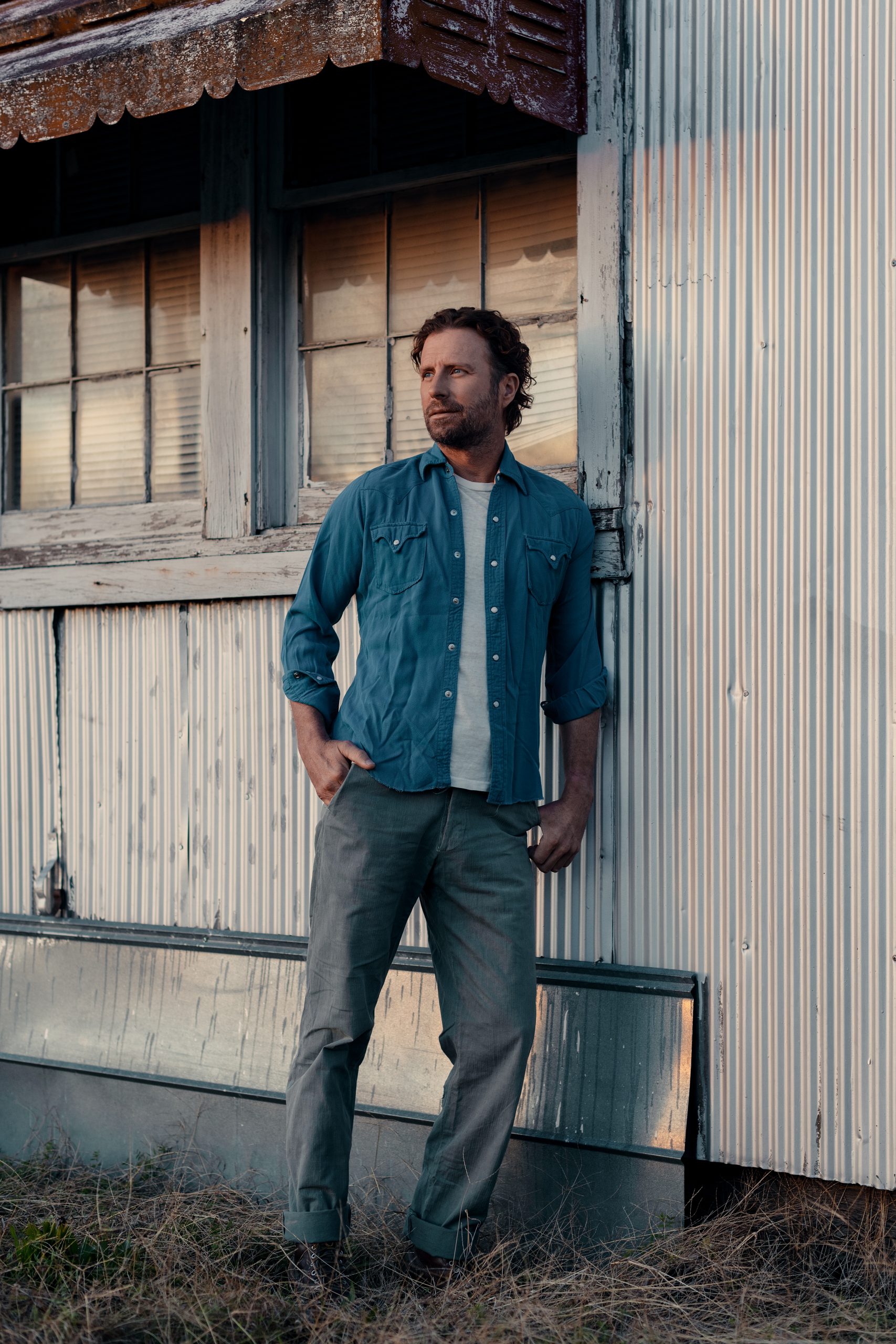The country star sits down with Cowboys & Indians in Nashville to talk about his life in Tennessee, his steadfast love for the West, and his new album Broken Branches.
When Dierks Bentley wanted to manifest a life out West, he took a page out of Joel Osteen’s book to get him there. He had a burlap backpack that he hung by his door. He wrote “West” on a piece of duct tape, and stuck it on that backpack.
“Every time I walked through the door, I’d see ‘West.’ I looked at it every day. And lo and behold, one day we were in Colorado for spring break skiing, and the world shut down. We stayed out there for a year,” Bentley said of his unofficial Telluride quarantine during those unprecedented times. “I don’t think I manifested Covid, that’d be terrible. But I did manifest my somehow winding up in Colorado for that period of time. It was definitely the most special year of my life.”
But while the Grammy nominated singer-songwriter admits he’d love to end up out West eventually, Nashville is home. And it has been for the last 30 years, when he drove from Phoenix in the same pick-up truck he still has today. It was a 24-hour journey, but he and his dad stopped halfway in Van Buren, Arkansas. “We were just listening to country radio,” he said of the soundtrack of their road trip. “One station dies out and you go find a new one. I would love to have been recording our conversations.”
It was Bentley’s father, who died in 2012, who first stamped his son’s taste in music. “My dad loved country music. And Randy Travis was on the radio a lot. And George Strait was on the radio a lot. We didn’t really talk about country music. We just loved listening to it. It wasn’t until I got to Nashville and went to the Station Inn on a whim, and saw a bunch of young kids playing bluegrass instruments and playing the fire out of ‘em. Then I was like, ‘This is not old people’s music. This is almost punk-rock country music.’ It was 1994 when I discovered it. I wouldn’t be here if I hadn’t walked into that bar.”
Now, three decades and eleven albums later, Bentley is a treasured Nashville fixture who just might head West when the time is right.
Cowboys & Indians: You’ve truly made Nashville your home, but you have a love of the West that is absolutely unmatched. What is it that draws you out there time and time again?
Dierks Bentley: Just to be there with my kids, set my guitar down, have weekends off for as far as you could see, really be able to settle in my life, actually unpack a suitcase and just be present. I think we camped nine times that spring and summer. I taught my kids how to skateboard at a skate park. We did so much hiking and skiing. It was the best time of my life. That said, I do love Tennessee. And I’ve really fallen back in love with Tennessee, knowing that Colorado will be there at some point in my life. This is a special place to be. I feel like country music has never been better. There’s so much great country music, and a lot of western in country music right now.
It’s just the American spirit, no matter where you live in the country, there’s just this idea of going West, and that kind of cowboy culture is built into our DNA in some way.
C&I: Do you still have the backpack by the door?
Bentley: No. The “West” backpack is down. When you’re from the West, it just never really gets outta your bones.
C&I: I don’t know about you, but I leaned in really hard to the 90’s cowboy themes. Like Garth Brooks’ “Rodeo,” George Strait’s “I Can Still Make Cheyenne,” and Toby Keith’s “Should’ve Been a Cowboy.” Did you like those kinds of cowboy songs?
Bentley: Absolutely. Oh my gosh, I loved Chris LeDoux. Like a lot of people, I got turned on to Chris by Garth Brooks. He mentioned Chris LeDoux in a song and then you fall way in love. It’s just the American spirit, no matter where you live in the country, there’s just this idea of going West, and that kind of cowboy culture is built into our DNA in some way.
C&I: The songs on your new album are not overtly cowboy songs, but they’re still so country. Meaning your 11th album is as country as your debut album in 2003. So for 22 years, you’ve been able to maintain this countryness, now with songs like “Broken Branches,” “Off the Map,” “Jesus Loves Me” and “Never You.”
Bentley: And “Standing in the Sun” reminds me of being out in Sedona, Arizona, or somewhere just out there in the middle of nowhere. And the sunrises and sunsets in the West that you can’t find anywhere else. And what I love about “Off the Map” is the hook of the song (“I find myself off the map”) which is that it can be in your mind. Maybe you’re there — lucky you — or maybe you’re just at home on your couch and you’re mentally out there somewhere. I’m always trying to search for something new. A lot of that comes from the songs that say that in a way that I never could’ve written myself. And keeping it country, keeping it kind of bluegrass with those instruments upfront.
C&I: You chose the right people to collaborate with — Miranda Lambert, Riley Green, John Anderson. I don’t know if that was intentional, to stay loyal to the genre.
Bentley: It’s true. You’ve got Miranda, and she loves the West. She’s a Texas girl but I think she’s gonna die in Arizona. And then Riley and John, I guess I gravitate toward people who are pretty country. When I heard “Broken Branches,” I thought, “I love the song because we’re all broken branches. You, me, we’re all doing something different from our family. That’s the core of this family tree.
C&I: So now you’ve got these 11 new songs, and if my girl math is correct, you’ve recorded 134 songs. When you sit down to make a set list for the Broken Branches tour, how do you take all those songs and whittle it down?
Bentley: When I’m making a set list, I’m always thinking about keeping it moving, the rollercoaster ride. I tend to keep the set list on the bigger hits. My problem is, I think about the show too much from a fan experience. They spend all this money to be here. I don’t want to pack three hours of music into a 90-minute set list. I’m happy when they’re happy. I just have too much respect for their time and money to do a three-hour show.
I thought Arizona was where country music lived in the West.
C&I: When you were still living in Arizona, did you go to any big headlining shows? And did you have an epiphany like, “I want to do that for a living.”
Bentley: Actually, the first show that made me feel like I really wanted to do it for a living was Bon Jovi and Skid Row in Arizona. I was 13. Then I saw Dwight Yoakam and LeAnn Rimes when I was around 15 and that had a huge impact on me. Then I saw Garth Brooks in the worst seat possible when I was 17 in America West Arena. I mean, the seat was so bad I could touch the roof where the seats meet the roof. My little brother and I snuck down somehow in the middle of the show. We got down pretty close to the stage. You felt like he was singing to every single person in the room. I saw everyone that came through: Alan Jackson, Travis Tritt, everyone. I thought Arizona was where country music lived in the West. It was weird getting to Tennessee and people saying, ‘How’d you get into country music living in Arizona?” I’m like, “We are country.”
C&I: Where do you feel more at home? On a stage or on a mountain somewhere?
Bentley: Those are the two places I really do feel at home, honestly. It’s hard to differentiate those two because I love being on stage. Everything I do is for that moment, to be out there with the band and knowing we put the work in to make the album and make the tour. When you’re on stage, you’re present. I think it’s the best feeling. It’s like meditation. That’s when life feels the best. And then when you’re on a mountain with just your wife, that’s just the closest you can get to heaven. You know, we’re getting ready to walk into AI and not being able to tell what’s real and what’s not real. But on top of a mountain, that’s the only place left that is real.
















